Report: Taylorism Applicability in Modern Organizations and Culture
VerifiedAdded on 2021/01/02
|8
|1575
|293
Report
AI Summary
This report investigates the applicability of Taylorism in contemporary management and organizational structures, considering its relevance in the modern business environment. The report begins with an executive summary and an introduction outlining the scope of the study. It explores the principles of Taylorism and Fordism, discussing their acceptance in Australia, America, and Europe today, acknowledging changes in technology and automation. The report analyzes the application of Taylorism in call centers and identifies potential areas where its principles might still be relevant. A key component of the report involves comparing Australian culture with the UK's using Hofstede's five cultural dimensions: Power Distance, Individualism, Masculinity, Uncertainty Avoidance, and Long-Term Orientation. It also provides survey results for Australian culture. The report concludes that while Taylorism in its original form may not be fully accepted today, its principles can still be applied in various industries and countries, particularly for start-ups. The report includes references to relevant books and journals, along with an online source for cultural comparisons.
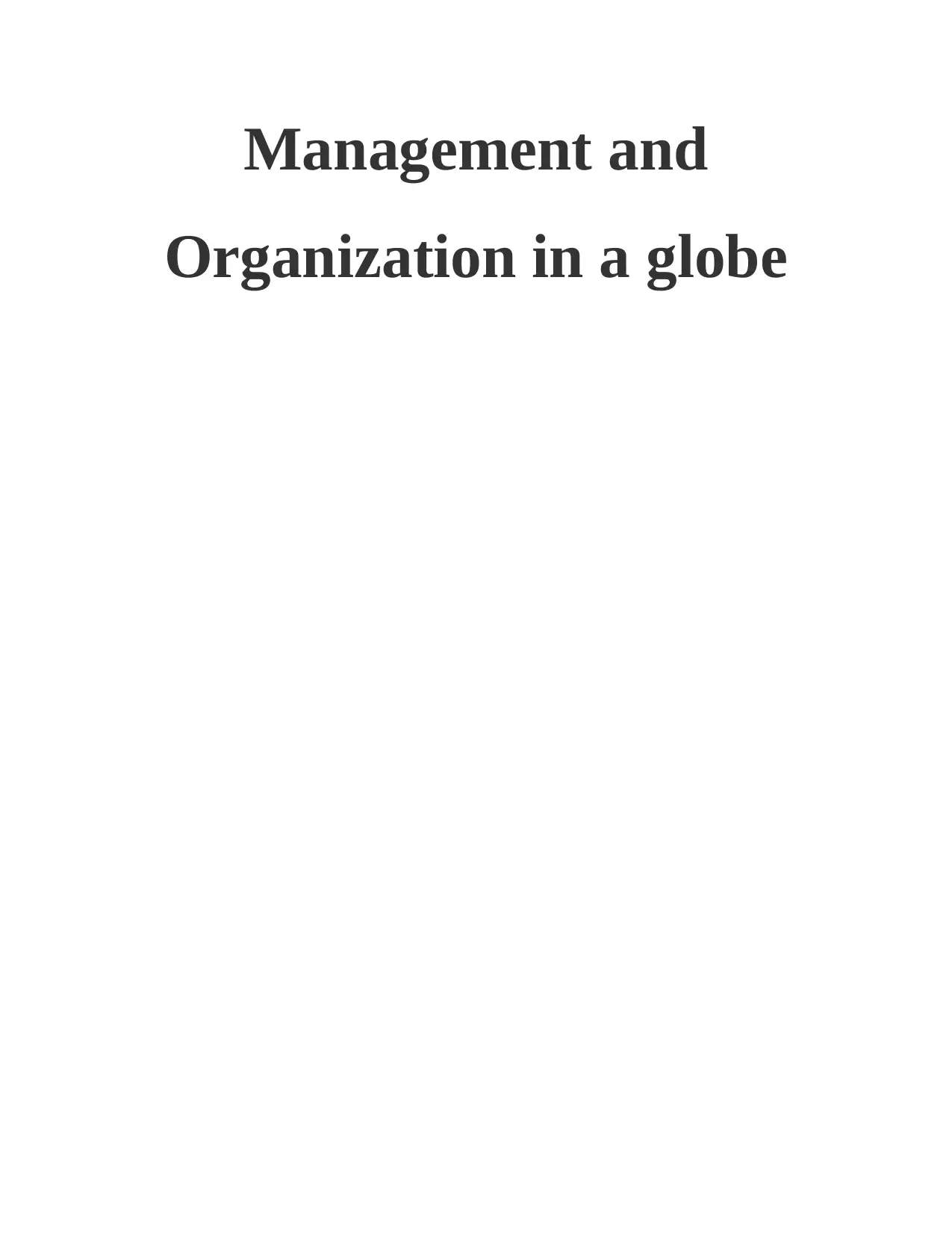
Management and
Organization in a globe
Organization in a globe
Paraphrase This Document
Need a fresh take? Get an instant paraphrase of this document with our AI Paraphraser
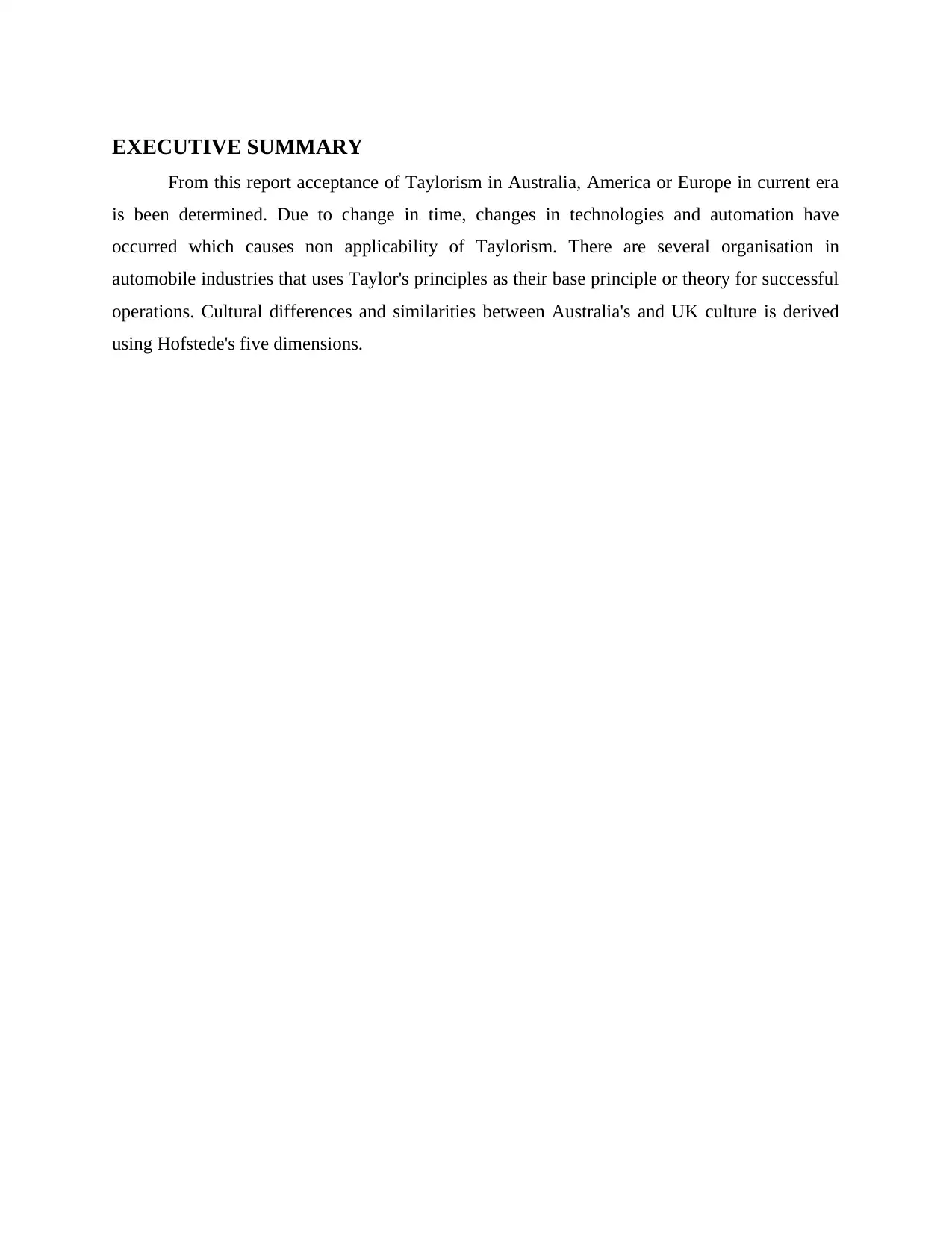
EXECUTIVE SUMMARY
From this report acceptance of Taylorism in Australia, America or Europe in current era
is been determined. Due to change in time, changes in technologies and automation have
occurred which causes non applicability of Taylorism. There are several organisation in
automobile industries that uses Taylor's principles as their base principle or theory for successful
operations. Cultural differences and similarities between Australia's and UK culture is derived
using Hofstede's five dimensions.
From this report acceptance of Taylorism in Australia, America or Europe in current era
is been determined. Due to change in time, changes in technologies and automation have
occurred which causes non applicability of Taylorism. There are several organisation in
automobile industries that uses Taylor's principles as their base principle or theory for successful
operations. Cultural differences and similarities between Australia's and UK culture is derived
using Hofstede's five dimensions.
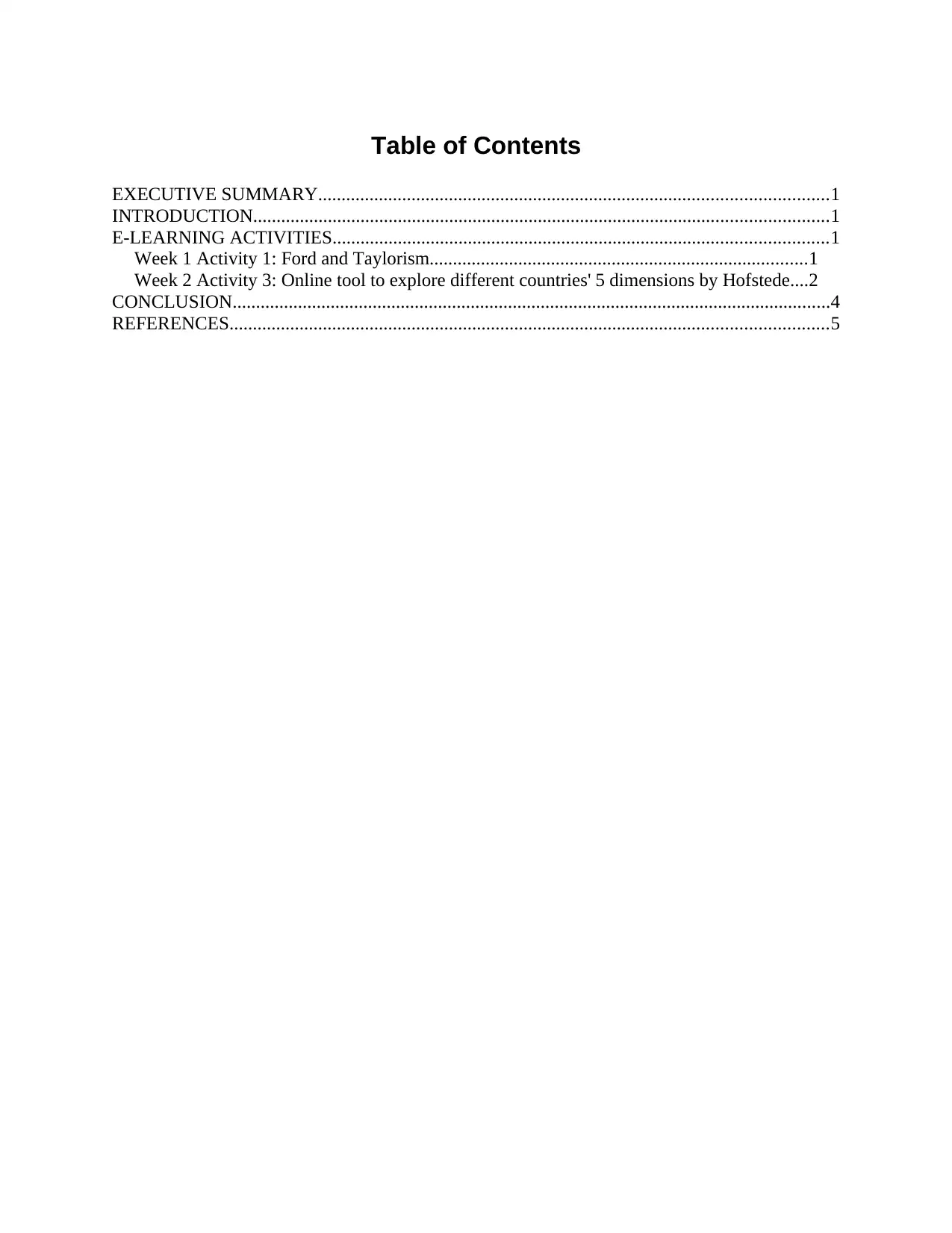
Table of Contents
EXECUTIVE SUMMARY.............................................................................................................1
INTRODUCTION...........................................................................................................................1
E-LEARNING ACTIVITIES..........................................................................................................1
Week 1 Activity 1: Ford and Taylorism.................................................................................1
Week 2 Activity 3: Online tool to explore different countries' 5 dimensions by Hofstede....2
CONCLUSION................................................................................................................................4
REFERENCES................................................................................................................................5
EXECUTIVE SUMMARY.............................................................................................................1
INTRODUCTION...........................................................................................................................1
E-LEARNING ACTIVITIES..........................................................................................................1
Week 1 Activity 1: Ford and Taylorism.................................................................................1
Week 2 Activity 3: Online tool to explore different countries' 5 dimensions by Hofstede....2
CONCLUSION................................................................................................................................4
REFERENCES................................................................................................................................5
⊘ This is a preview!⊘
Do you want full access?
Subscribe today to unlock all pages.

Trusted by 1+ million students worldwide
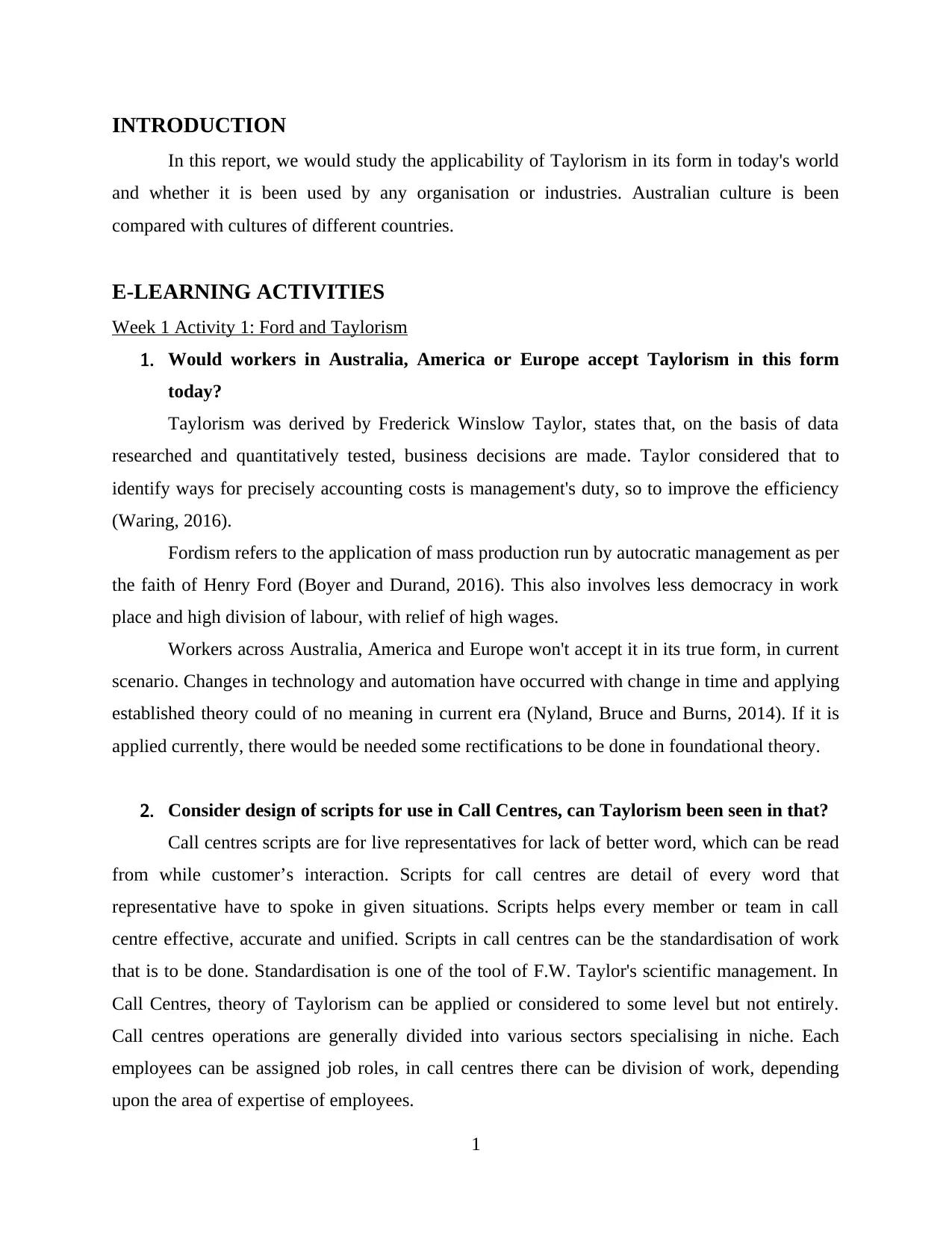
INTRODUCTION
In this report, we would study the applicability of Taylorism in its form in today's world
and whether it is been used by any organisation or industries. Australian culture is been
compared with cultures of different countries.
E-LEARNING ACTIVITIES
Week 1 Activity 1: Ford and Taylorism
1. Would workers in Australia, America or Europe accept Taylorism in this form
today?
Taylorism was derived by Frederick Winslow Taylor, states that, on the basis of data
researched and quantitatively tested, business decisions are made. Taylor considered that to
identify ways for precisely accounting costs is management's duty, so to improve the efficiency
(Waring, 2016).
Fordism refers to the application of mass production run by autocratic management as per
the faith of Henry Ford (Boyer and Durand, 2016). This also involves less democracy in work
place and high division of labour, with relief of high wages.
Workers across Australia, America and Europe won't accept it in its true form, in current
scenario. Changes in technology and automation have occurred with change in time and applying
established theory could of no meaning in current era (Nyland, Bruce and Burns, 2014). If it is
applied currently, there would be needed some rectifications to be done in foundational theory.
2. Consider design of scripts for use in Call Centres, can Taylorism been seen in that?
Call centres scripts are for live representatives for lack of better word, which can be read
from while customer’s interaction. Scripts for call centres are detail of every word that
representative have to spoke in given situations. Scripts helps every member or team in call
centre effective, accurate and unified. Scripts in call centres can be the standardisation of work
that is to be done. Standardisation is one of the tool of F.W. Taylor's scientific management. In
Call Centres, theory of Taylorism can be applied or considered to some level but not entirely.
Call centres operations are generally divided into various sectors specialising in niche. Each
employees can be assigned job roles, in call centres there can be division of work, depending
upon the area of expertise of employees.
1
In this report, we would study the applicability of Taylorism in its form in today's world
and whether it is been used by any organisation or industries. Australian culture is been
compared with cultures of different countries.
E-LEARNING ACTIVITIES
Week 1 Activity 1: Ford and Taylorism
1. Would workers in Australia, America or Europe accept Taylorism in this form
today?
Taylorism was derived by Frederick Winslow Taylor, states that, on the basis of data
researched and quantitatively tested, business decisions are made. Taylor considered that to
identify ways for precisely accounting costs is management's duty, so to improve the efficiency
(Waring, 2016).
Fordism refers to the application of mass production run by autocratic management as per
the faith of Henry Ford (Boyer and Durand, 2016). This also involves less democracy in work
place and high division of labour, with relief of high wages.
Workers across Australia, America and Europe won't accept it in its true form, in current
scenario. Changes in technology and automation have occurred with change in time and applying
established theory could of no meaning in current era (Nyland, Bruce and Burns, 2014). If it is
applied currently, there would be needed some rectifications to be done in foundational theory.
2. Consider design of scripts for use in Call Centres, can Taylorism been seen in that?
Call centres scripts are for live representatives for lack of better word, which can be read
from while customer’s interaction. Scripts for call centres are detail of every word that
representative have to spoke in given situations. Scripts helps every member or team in call
centre effective, accurate and unified. Scripts in call centres can be the standardisation of work
that is to be done. Standardisation is one of the tool of F.W. Taylor's scientific management. In
Call Centres, theory of Taylorism can be applied or considered to some level but not entirely.
Call centres operations are generally divided into various sectors specialising in niche. Each
employees can be assigned job roles, in call centres there can be division of work, depending
upon the area of expertise of employees.
1
Paraphrase This Document
Need a fresh take? Get an instant paraphrase of this document with our AI Paraphraser
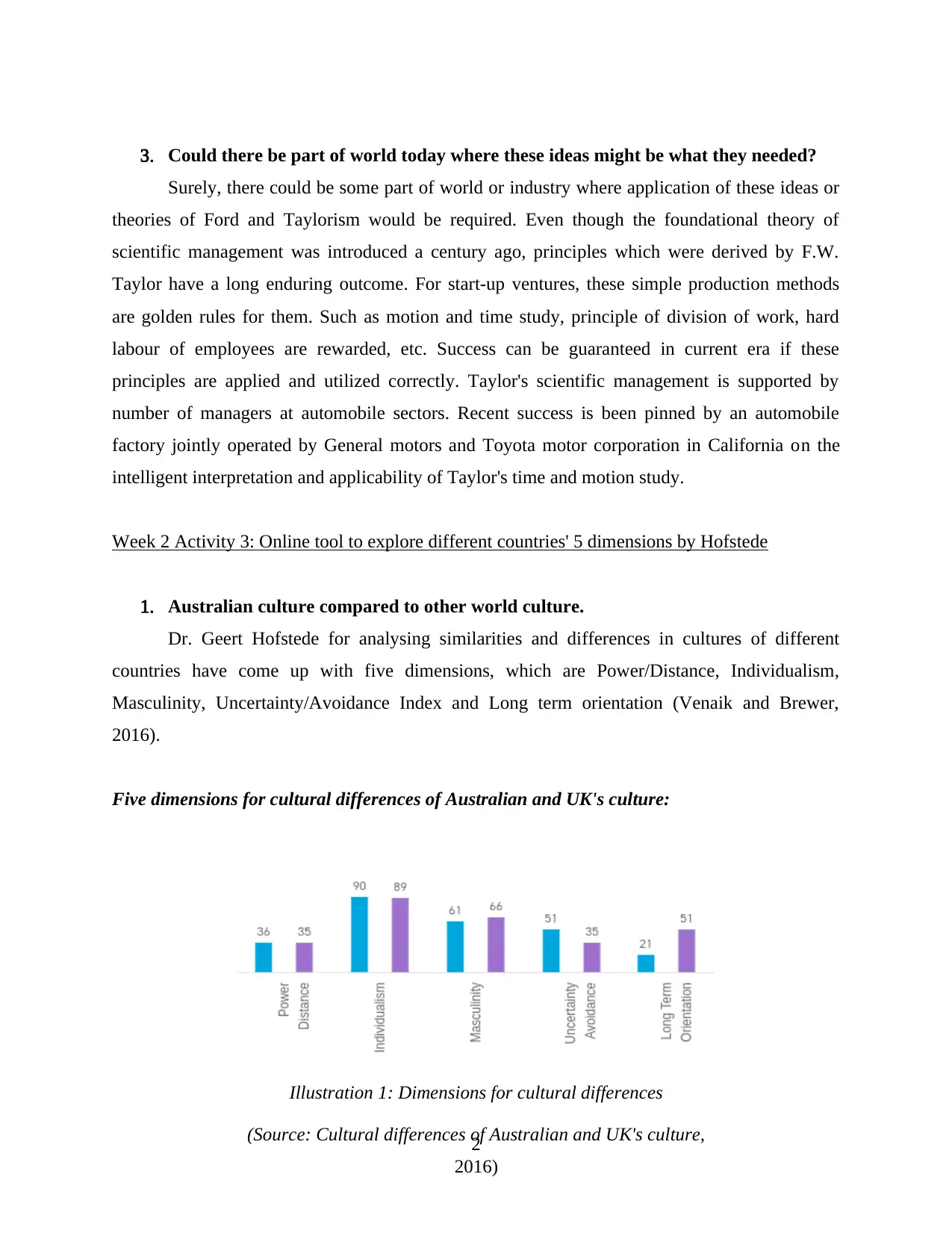
3. Could there be part of world today where these ideas might be what they needed?
Surely, there could be some part of world or industry where application of these ideas or
theories of Ford and Taylorism would be required. Even though the foundational theory of
scientific management was introduced a century ago, principles which were derived by F.W.
Taylor have a long enduring outcome. For start-up ventures, these simple production methods
are golden rules for them. Such as motion and time study, principle of division of work, hard
labour of employees are rewarded, etc. Success can be guaranteed in current era if these
principles are applied and utilized correctly. Taylor's scientific management is supported by
number of managers at automobile sectors. Recent success is been pinned by an automobile
factory jointly operated by General motors and Toyota motor corporation in California on the
intelligent interpretation and applicability of Taylor's time and motion study.
Week 2 Activity 3: Online tool to explore different countries' 5 dimensions by Hofstede
1. Australian culture compared to other world culture.
Dr. Geert Hofstede for analysing similarities and differences in cultures of different
countries have come up with five dimensions, which are Power/Distance, Individualism,
Masculinity, Uncertainty/Avoidance Index and Long term orientation (Venaik and Brewer,
2016).
Five dimensions for cultural differences of Australian and UK's culture:
2
Illustration 1: Dimensions for cultural differences
(Source: Cultural differences of Australian and UK's culture,
2016)
Surely, there could be some part of world or industry where application of these ideas or
theories of Ford and Taylorism would be required. Even though the foundational theory of
scientific management was introduced a century ago, principles which were derived by F.W.
Taylor have a long enduring outcome. For start-up ventures, these simple production methods
are golden rules for them. Such as motion and time study, principle of division of work, hard
labour of employees are rewarded, etc. Success can be guaranteed in current era if these
principles are applied and utilized correctly. Taylor's scientific management is supported by
number of managers at automobile sectors. Recent success is been pinned by an automobile
factory jointly operated by General motors and Toyota motor corporation in California on the
intelligent interpretation and applicability of Taylor's time and motion study.
Week 2 Activity 3: Online tool to explore different countries' 5 dimensions by Hofstede
1. Australian culture compared to other world culture.
Dr. Geert Hofstede for analysing similarities and differences in cultures of different
countries have come up with five dimensions, which are Power/Distance, Individualism,
Masculinity, Uncertainty/Avoidance Index and Long term orientation (Venaik and Brewer,
2016).
Five dimensions for cultural differences of Australian and UK's culture:
2
Illustration 1: Dimensions for cultural differences
(Source: Cultural differences of Australian and UK's culture,
2016)
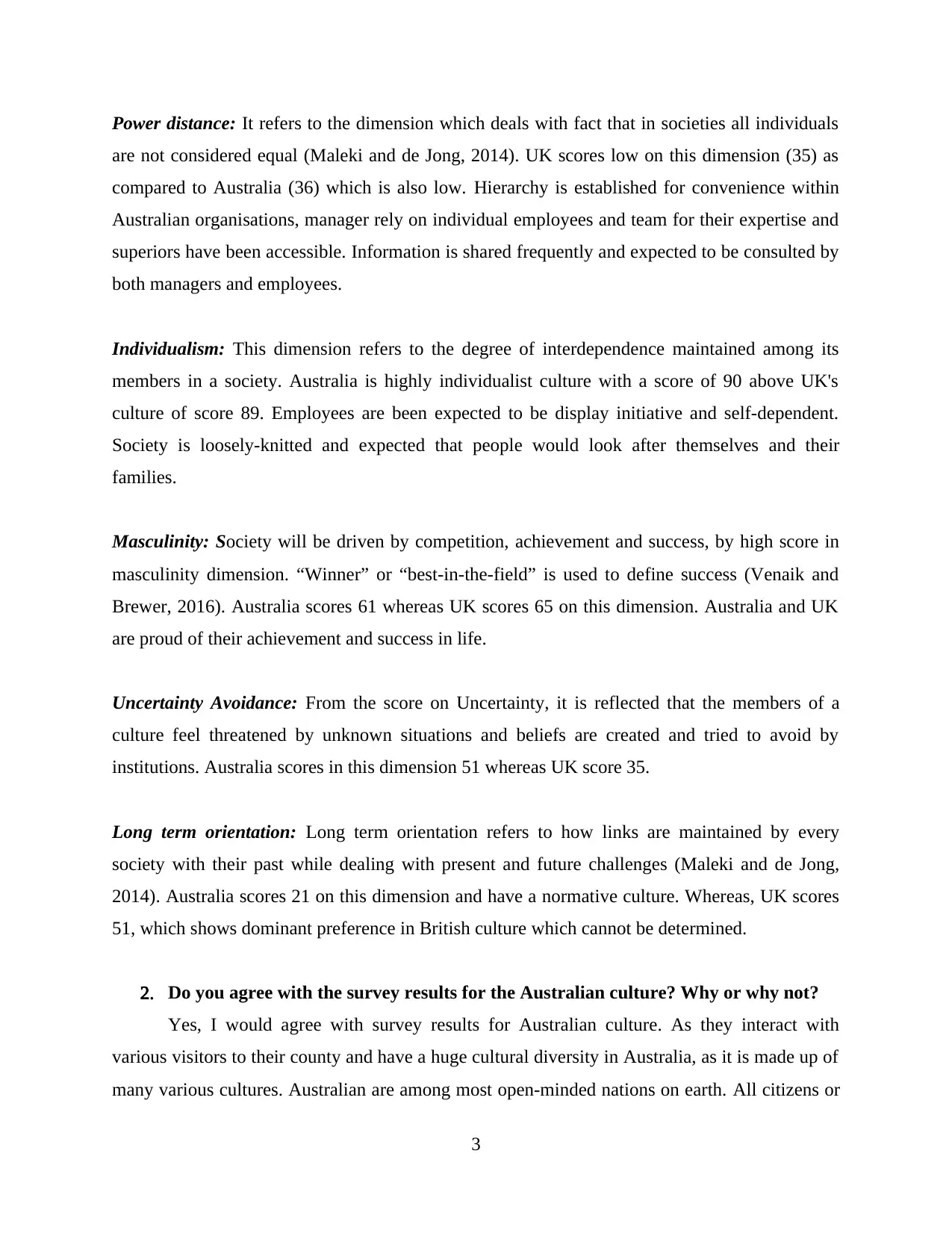
Power distance: It refers to the dimension which deals with fact that in societies all individuals
are not considered equal (Maleki and de Jong, 2014). UK scores low on this dimension (35) as
compared to Australia (36) which is also low. Hierarchy is established for convenience within
Australian organisations, manager rely on individual employees and team for their expertise and
superiors have been accessible. Information is shared frequently and expected to be consulted by
both managers and employees.
Individualism: This dimension refers to the degree of interdependence maintained among its
members in a society. Australia is highly individualist culture with a score of 90 above UK's
culture of score 89. Employees are been expected to be display initiative and self-dependent.
Society is loosely-knitted and expected that people would look after themselves and their
families.
Masculinity: Society will be driven by competition, achievement and success, by high score in
masculinity dimension. “Winner” or “best-in-the-field” is used to define success (Venaik and
Brewer, 2016). Australia scores 61 whereas UK scores 65 on this dimension. Australia and UK
are proud of their achievement and success in life.
Uncertainty Avoidance: From the score on Uncertainty, it is reflected that the members of a
culture feel threatened by unknown situations and beliefs are created and tried to avoid by
institutions. Australia scores in this dimension 51 whereas UK score 35.
Long term orientation: Long term orientation refers to how links are maintained by every
society with their past while dealing with present and future challenges (Maleki and de Jong,
2014). Australia scores 21 on this dimension and have a normative culture. Whereas, UK scores
51, which shows dominant preference in British culture which cannot be determined.
2. Do you agree with the survey results for the Australian culture? Why or why not?
Yes, I would agree with survey results for Australian culture. As they interact with
various visitors to their county and have a huge cultural diversity in Australia, as it is made up of
many various cultures. Australian are among most open-minded nations on earth. All citizens or
3
are not considered equal (Maleki and de Jong, 2014). UK scores low on this dimension (35) as
compared to Australia (36) which is also low. Hierarchy is established for convenience within
Australian organisations, manager rely on individual employees and team for their expertise and
superiors have been accessible. Information is shared frequently and expected to be consulted by
both managers and employees.
Individualism: This dimension refers to the degree of interdependence maintained among its
members in a society. Australia is highly individualist culture with a score of 90 above UK's
culture of score 89. Employees are been expected to be display initiative and self-dependent.
Society is loosely-knitted and expected that people would look after themselves and their
families.
Masculinity: Society will be driven by competition, achievement and success, by high score in
masculinity dimension. “Winner” or “best-in-the-field” is used to define success (Venaik and
Brewer, 2016). Australia scores 61 whereas UK scores 65 on this dimension. Australia and UK
are proud of their achievement and success in life.
Uncertainty Avoidance: From the score on Uncertainty, it is reflected that the members of a
culture feel threatened by unknown situations and beliefs are created and tried to avoid by
institutions. Australia scores in this dimension 51 whereas UK score 35.
Long term orientation: Long term orientation refers to how links are maintained by every
society with their past while dealing with present and future challenges (Maleki and de Jong,
2014). Australia scores 21 on this dimension and have a normative culture. Whereas, UK scores
51, which shows dominant preference in British culture which cannot be determined.
2. Do you agree with the survey results for the Australian culture? Why or why not?
Yes, I would agree with survey results for Australian culture. As they interact with
various visitors to their county and have a huge cultural diversity in Australia, as it is made up of
many various cultures. Australian are among most open-minded nations on earth. All citizens or
3
⊘ This is a preview!⊘
Do you want full access?
Subscribe today to unlock all pages.

Trusted by 1+ million students worldwide
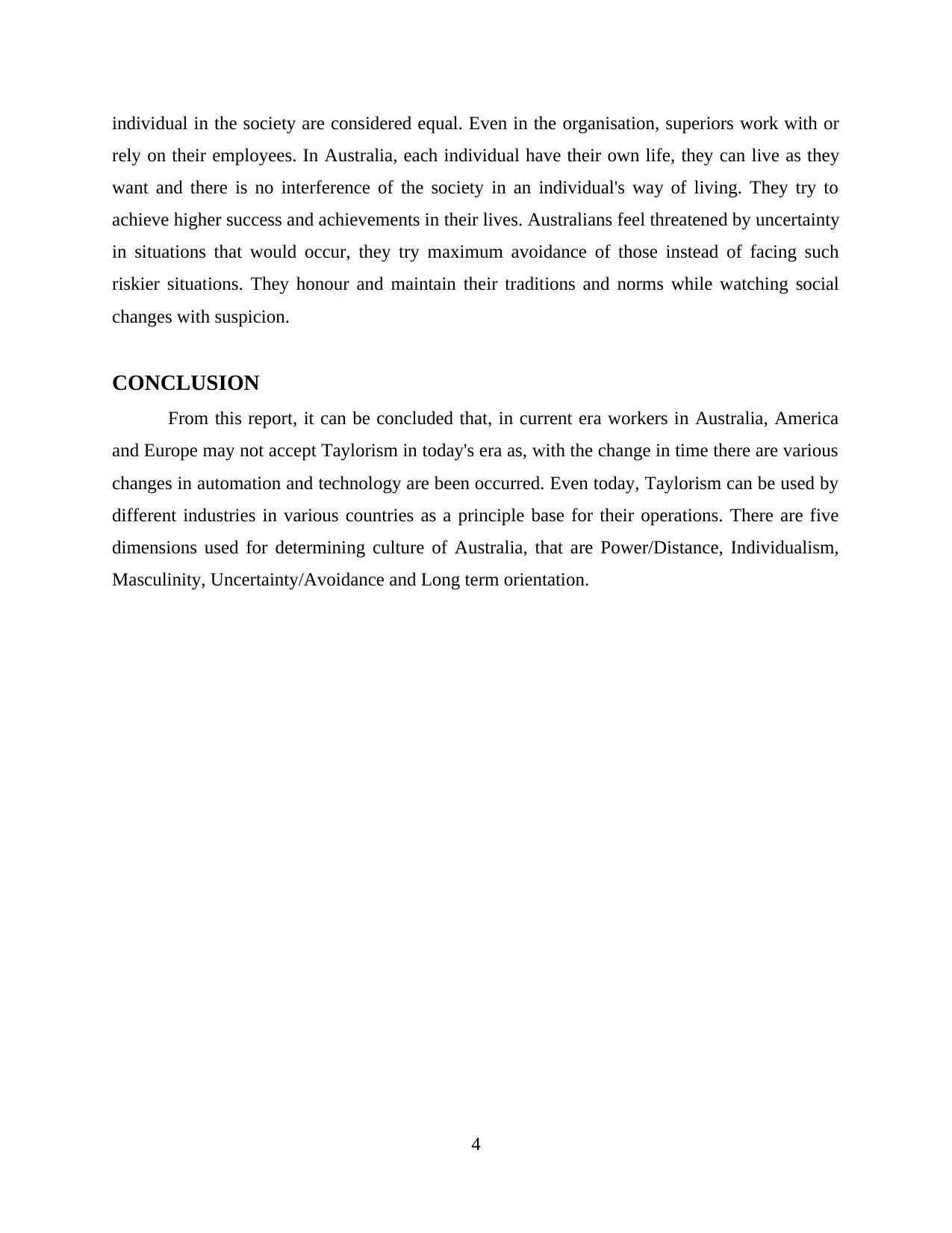
individual in the society are considered equal. Even in the organisation, superiors work with or
rely on their employees. In Australia, each individual have their own life, they can live as they
want and there is no interference of the society in an individual's way of living. They try to
achieve higher success and achievements in their lives. Australians feel threatened by uncertainty
in situations that would occur, they try maximum avoidance of those instead of facing such
riskier situations. They honour and maintain their traditions and norms while watching social
changes with suspicion.
CONCLUSION
From this report, it can be concluded that, in current era workers in Australia, America
and Europe may not accept Taylorism in today's era as, with the change in time there are various
changes in automation and technology are been occurred. Even today, Taylorism can be used by
different industries in various countries as a principle base for their operations. There are five
dimensions used for determining culture of Australia, that are Power/Distance, Individualism,
Masculinity, Uncertainty/Avoidance and Long term orientation.
4
rely on their employees. In Australia, each individual have their own life, they can live as they
want and there is no interference of the society in an individual's way of living. They try to
achieve higher success and achievements in their lives. Australians feel threatened by uncertainty
in situations that would occur, they try maximum avoidance of those instead of facing such
riskier situations. They honour and maintain their traditions and norms while watching social
changes with suspicion.
CONCLUSION
From this report, it can be concluded that, in current era workers in Australia, America
and Europe may not accept Taylorism in today's era as, with the change in time there are various
changes in automation and technology are been occurred. Even today, Taylorism can be used by
different industries in various countries as a principle base for their operations. There are five
dimensions used for determining culture of Australia, that are Power/Distance, Individualism,
Masculinity, Uncertainty/Avoidance and Long term orientation.
4
Paraphrase This Document
Need a fresh take? Get an instant paraphrase of this document with our AI Paraphraser
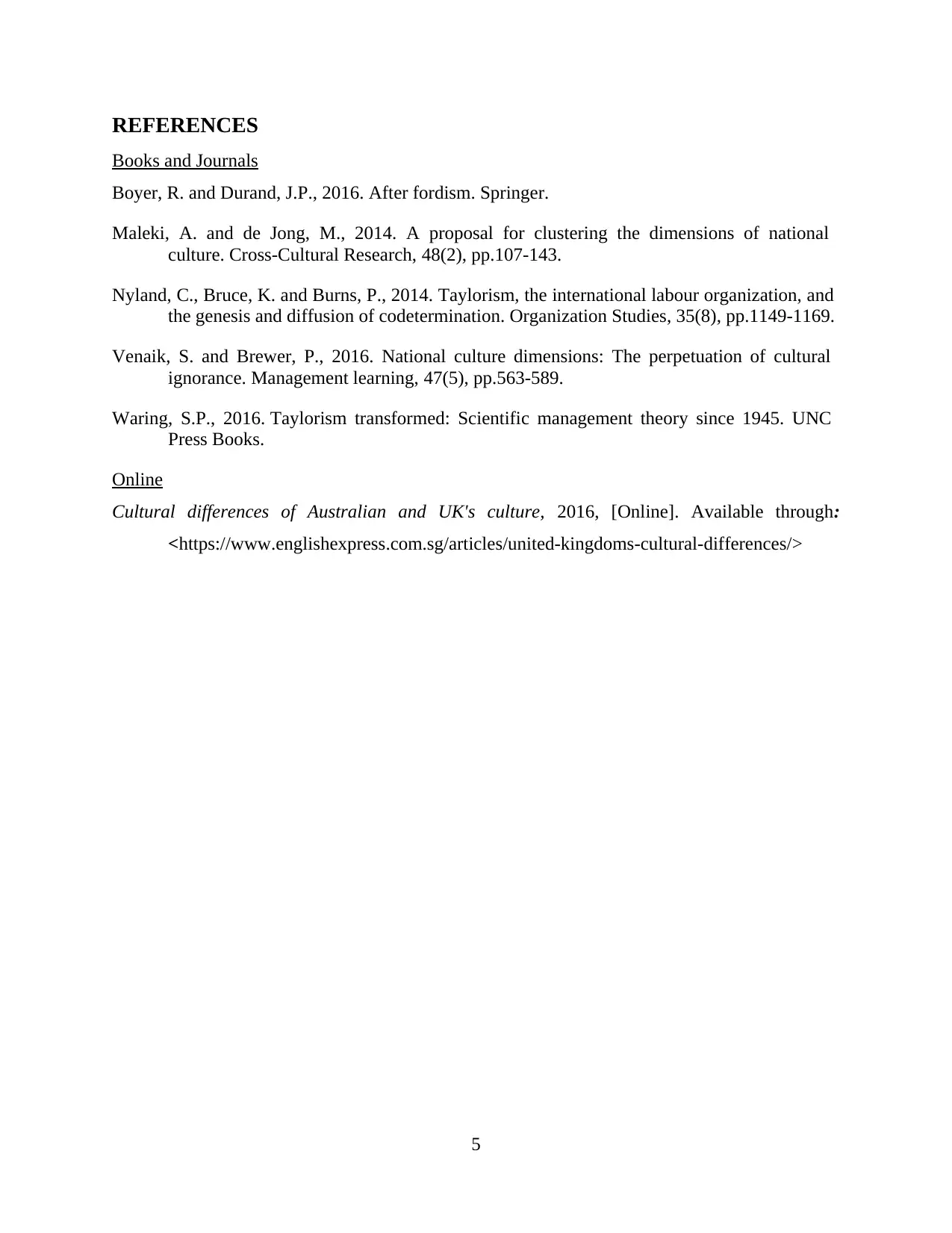
REFERENCES
Books and Journals
Boyer, R. and Durand, J.P., 2016. After fordism. Springer.
Maleki, A. and de Jong, M., 2014. A proposal for clustering the dimensions of national
culture. Cross-Cultural Research, 48(2), pp.107-143.
Nyland, C., Bruce, K. and Burns, P., 2014. Taylorism, the international labour organization, and
the genesis and diffusion of codetermination. Organization Studies, 35(8), pp.1149-1169.
Venaik, S. and Brewer, P., 2016. National culture dimensions: The perpetuation of cultural
ignorance. Management learning, 47(5), pp.563-589.
Waring, S.P., 2016. Taylorism transformed: Scientific management theory since 1945. UNC
Press Books.
Online
Cultural differences of Australian and UK's culture, 2016, [Online]. Available through:
<https://www.englishexpress.com.sg/articles/united-kingdoms-cultural-differences/>
5
Books and Journals
Boyer, R. and Durand, J.P., 2016. After fordism. Springer.
Maleki, A. and de Jong, M., 2014. A proposal for clustering the dimensions of national
culture. Cross-Cultural Research, 48(2), pp.107-143.
Nyland, C., Bruce, K. and Burns, P., 2014. Taylorism, the international labour organization, and
the genesis and diffusion of codetermination. Organization Studies, 35(8), pp.1149-1169.
Venaik, S. and Brewer, P., 2016. National culture dimensions: The perpetuation of cultural
ignorance. Management learning, 47(5), pp.563-589.
Waring, S.P., 2016. Taylorism transformed: Scientific management theory since 1945. UNC
Press Books.
Online
Cultural differences of Australian and UK's culture, 2016, [Online]. Available through:
<https://www.englishexpress.com.sg/articles/united-kingdoms-cultural-differences/>
5
1 out of 8
Related Documents
Your All-in-One AI-Powered Toolkit for Academic Success.
+13062052269
info@desklib.com
Available 24*7 on WhatsApp / Email
![[object Object]](/_next/static/media/star-bottom.7253800d.svg)
Unlock your academic potential
Copyright © 2020–2026 A2Z Services. All Rights Reserved. Developed and managed by ZUCOL.


